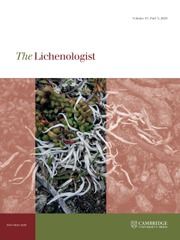Crossref Citations
This article has been cited by the following publications. This list is generated based on data provided by
Crossref.
Esslinger, Theodore L.
2001.
Recent Literature on Lichens—183*.
The Bryologist,
Vol. 104,
Issue. 4,
p.
625.
Hawksworth, D. L.
2002.
Monitoring with Lichens — Monitoring Lichens.
p.
11.
Budka, Dobrosława
Przybyłowicz, Wojciech J.
Mesjasz-Przybyłowicz, Jolanta
and
Sawicka-Kapusta, Katarzyna
2002.
Elemental distribution in lichens transplanted to polluted forest sites near Kraków (Poland).
Nuclear Instruments and Methods in Physics Research Section B: Beam Interactions with Materials and Atoms,
Vol. 189,
Issue. 1-4,
p.
499.
Pinho, P.
Augusto, S.
Branquinho, C.
Bio, A.
Pereira, M. J.
Soares, A.
and
Catarino, F.
2004.
Mapping Lichen Diversity as a First Step for Air Quality Assessment.
Journal of Atmospheric Chemistry,
Vol. 49,
Issue. 1-3,
p.
377.
Fernández-Salegui, A. B.
Terrón, A.
Barreno, E.
and
Nimis, P. L.
2007.
Biomonitoring with cryptogams near the power station of La Robla (León, Spain).
The Bryologist,
Vol. 110,
Issue. 4,
p.
723.
Pinho, P.
Augusto, S.
Máguas, C.
Pereira, M.J.
Soares, A.
and
Branquinho, C.
2008.
Impact of neighbourhood land-cover in epiphytic lichen diversity: Analysis of multiple factors working at different spatial scales.
Environmental Pollution,
Vol. 151,
Issue. 2,
p.
414.
Poličnik, Helena
Simončič, Primož
and
Batič, Franc
2008.
Monitoring air quality with lichens: A comparison between mapping in forest sites and in open areas.
Environmental Pollution,
Vol. 151,
Issue. 2,
p.
395.
Martins, Suzana Maria de Azevedo
Käffer, Márcia Isabel
and
Lemos, Alessandra
2008.
Liquens como bioindicadores da qualidade do ar numa área de termoelétrica, Rio Grande do Sul, Brasil.
Hoehnea,
Vol. 35,
Issue. 3,
p.
425.
Pinho, P.
Augusto, S.
Martins-Loução, M.A.
Pereira, M.J.
Soares, A.
Máguas, C.
and
Branquinho, C.
2008.
Causes of change in nitrophytic and oligotrophic lichen species in a Mediterranean climate: Impact of land cover and atmospheric pollutants.
Environmental Pollution,
Vol. 154,
Issue. 3,
p.
380.
Pinho, Pedro
Branquinho, Cristina
Cruz, Cristina
Tang, Y. Sim
Dias, Teresa
Rosa, Ana Paula
Máguas, Cristina
Martins-Loução, Maria-Amélia
and
Sutton, Mark A.
2009.
Atmospheric Ammonia.
p.
109.
Shukla, Vertika
Upreti, D. K.
and
Bajpai, Rajesh
2014.
Lichens to Biomonitor the Environment.
p.
97.
Meysurova, A. F.
Khizhnyak, S. D.
Notov, A. A.
and
Pakhomov, P. M.
2014.
Biomonitoring of Sulfur-Containing Pollutants in an Urban Atmosphere by FTIR Spectroscopy.
Journal of Applied Spectroscopy,
Vol. 81,
Issue. 4,
p.
654.
Ellis, Christopher J.
Yahr, Rebecca
Belinchón, Rocío
and
Coppins, Brian J.
2014.
Archaeobotanical evidence for climate as a driver of ecological community change across the anthropocene boundary.
Global Change Biology,
Vol. 20,
Issue. 7,
p.
2211.
GARRIDO-BENAVENT, Isaac
LLOP, Esteve
and
GÓMEZ-BOLEA, Antonio
2015.
The effect of agriculture management and fire on epiphytic lichens on holm oak trees in the eastern Iberian Peninsula.
The Lichenologist,
Vol. 47,
Issue. 1,
p.
59.
Payne, Richard J.
Belyakova, Olga
and
Mazei, Yuri
2015.
Diversity and community ecology of forest epiphyte testate amoebae from European Russia.
European Journal of Protistology,
Vol. 51,
Issue. 5,
p.
450.
Dittrich, Sebastian
Lang, Robert
Albrecht, Birte Marie
Stetzka, Klaus Max
and
von Oheimb, Goddert
2022.
Vertical distribution of cryptogamic epiphytes on trees in central German alluvial hardwood forests: relevance for bioindication and nature conservation.
Herzogia,
Vol. 35,
Issue. 2,


